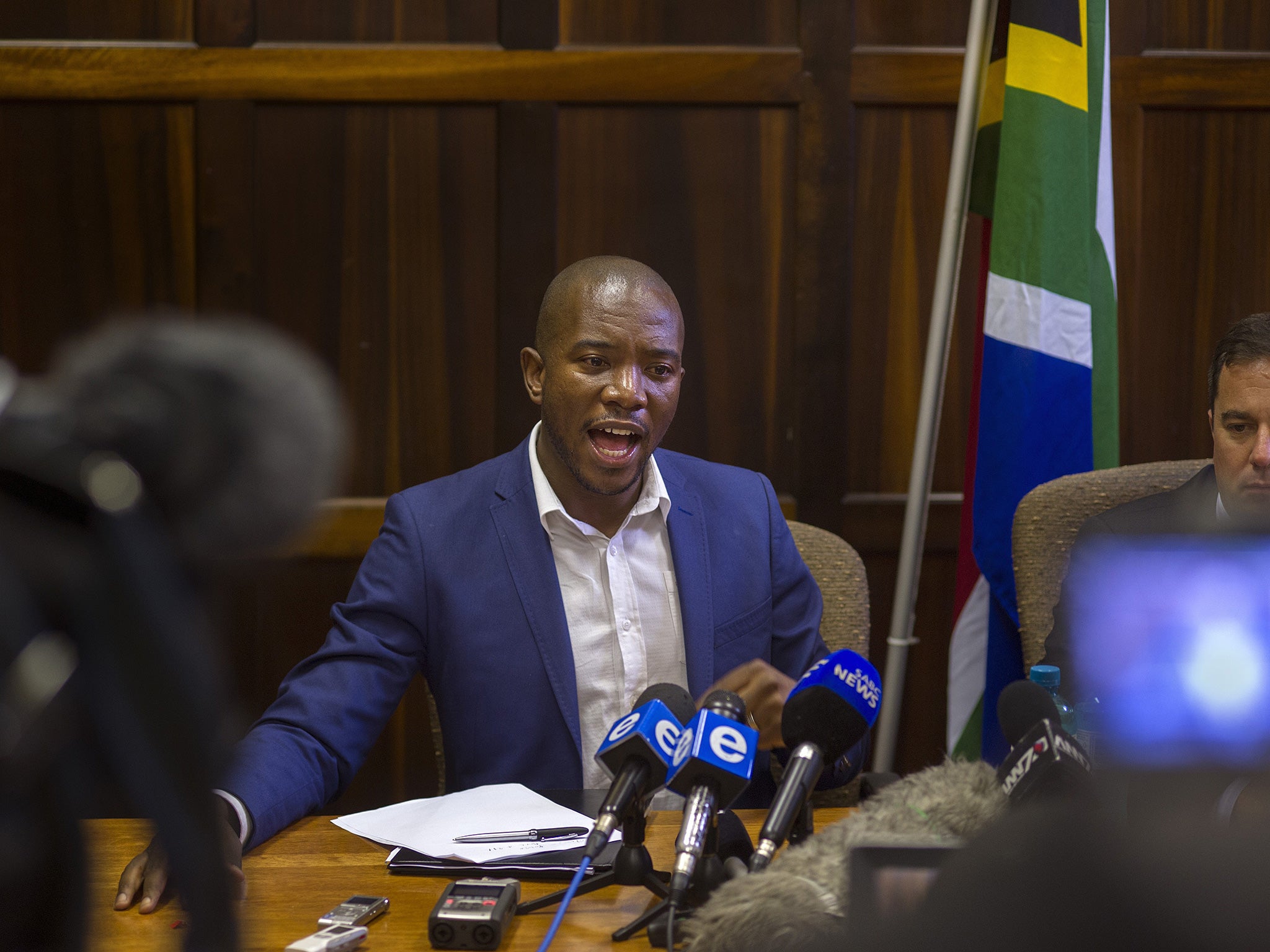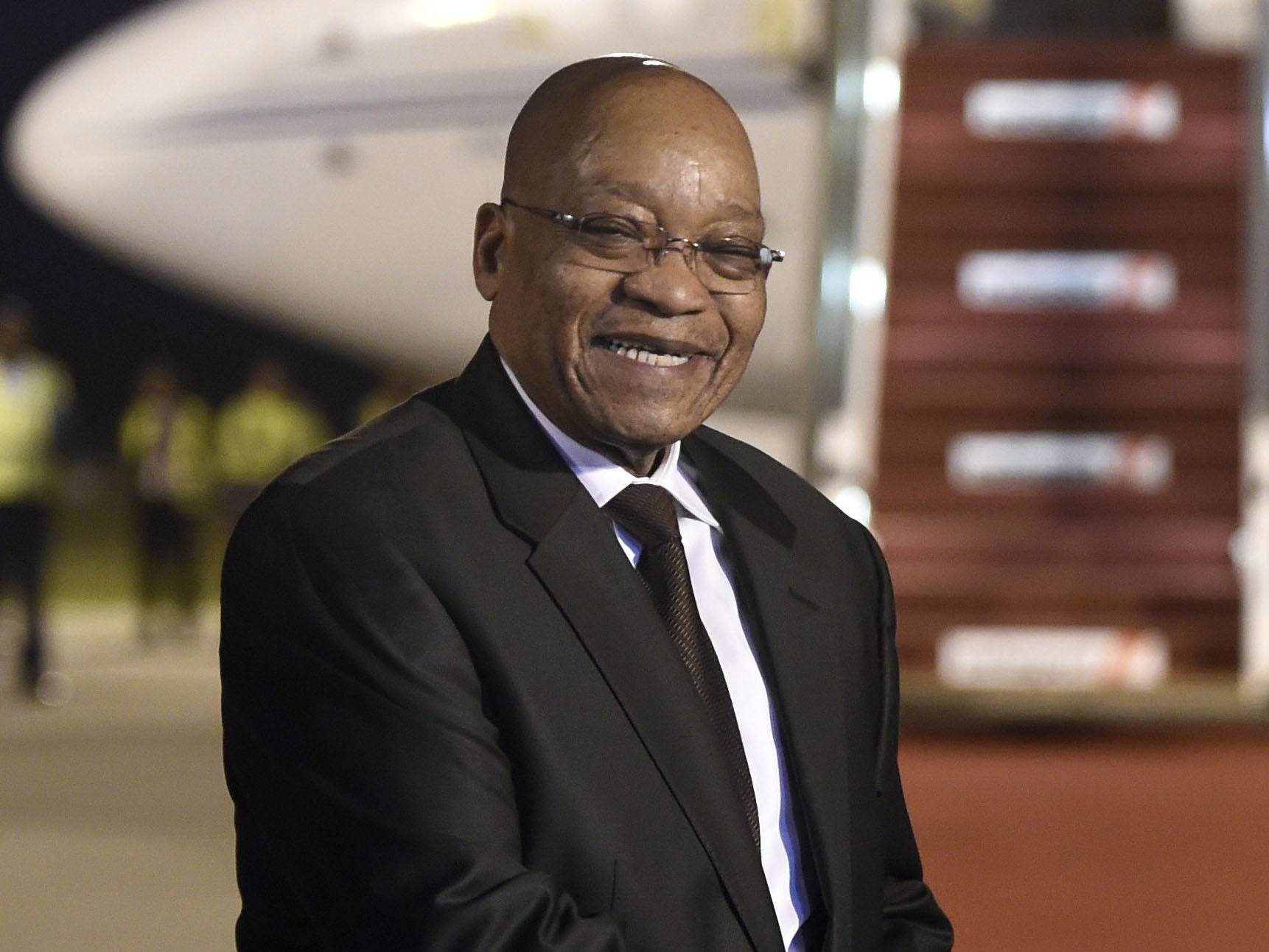Mmusi Maimane: South Africa opposition leader vows to 'stand up against President Zuma'
Head of the Democratic Alliance is promising to wage war on alleged corruption blighting the ruling ANC. He tells Lawrie Holmes how he plans to take on a head of state who has already 'dodged' hundreds of cases

Mmusi Maimane, the first black leader of South Africa’s opposition Democratic Alliance party (DA), is in forceful mood. With next year’s local elections looming, he is about to start a campaign that will highlight allegations of corruption against President Jacob Zuma and his governing ANC party. After months travelling the country since his landslide election as leader in May, next month Mr Maimane will unveil his party’s plan to tackle what he sees as South Africa’s greatest challenge: creating millions of jobs and ending economic stagnation.
“I will focus on a massive campaign that says ‘Jobs, jobs, jobs’,” Mr Maimane told The Independent. Unemployment is running at up to 35 per cent, he says – and he will link the ANC’s failure to the corruption allegations against it that taint South African politics.
“South Africans say, ‘I don’t have a job because the ANC is corrupt,’” says Mr Maimane, referring to claims that ANC councillors responsible for a vast jobs programme only give work to ANC members. “People are starting to say, ‘How is it that jobs are issued on the basis of party affiliation?’”
He will reserve his strongest attack for Mr Zuma himself – who he says has dodged “hundreds” of corruption charges, including those relating to the £11.9m of state funds used to upgrade his private compound at Nklanda. “People are saying this is no longer the ANC of Mandela, but the ANC of Jacob Zuma, one that is epitomised by corruption. We’ve got to make sure that distinction is clear.” Mr Zuma and the ANC deny the allegations.
Mr Maimane says the powers vested in South Africa’s President by the constitution, written in 1994, had Nelson Mandela in mind, and “not a President with 700 charges against him, with power solely on his shoulders to appoint the national police commissioner, the national director of public prosecutions”. These constitutional powers “need to undergo a serious review,” he said.

The DA has applied to join in an action before the Constitutional Court over a critical report on Nklanda by the country’s “public protector” – the official anti-corruption watchdog – this year. That report recommended that Mr Zuma pay back “a reasonable percentage” of public money used for upgrades not connected with security, and the firebrand leftist leader Julius Malema has already gained agreement for a case to be heard in February.
“This is a curtain-raiser to the real showdown with Zuma,” said Mr Maimane. “The wheels of justice move slowly, but boy do they move. We’ve kept the pressure on that issue because we believe ultimately we’ll get to a point where we’ll say, ‘Review the decision to charge Zuma, and ultimately charge him.’”
More broadly, Mr Maimane wants constitutional reform to challenge the ANC patronage, which he says has ensured investigations, such as that into the Marikana mine massacre in 2012, are ineffective.
He likens the ANC to South Africa’s former apartheid regime when he describes the governing party’s attempt to “capture” the state broadcasting company, to undermine the judiciary and to hobble the revenue-collecting authority – all institutions that he says the DA will fight to protect.
“Like we stood up against apartheid, we will stand up against this government, which is bent on practising some of the tactics used by the National Party government,” said Mr Maimane, himself a former ANC member.
The DA under Mr Maimane has also pressed the government over its decision not to arrest the Sudanese leader, Omar al-Bashir, on his recent visit to South Africa, despite pleas from the International Criminal Court.
But for now, all eyes are on next year’s municipal elections, which Mr Maimane hopes will prove a stepping stone to success before the next national election in 2019. Despite the country’s dire economic problems, the ANC has lost little of its support, winning 62 per cent of the vote in elections last year. The DA’s vote rose from 17 per cent to 22 per cent – but only 8 per cent of that was from black voters. Its former leader, Helen Zille, was herself white, and the party hopes Mr Mamaine will broaden its appeal. He was born to factory workers in the black township of Soweto but his wife, Natalie, is white and he is basing the party’s prospects on its non-racialism.
Areas where the DA has won power locally, such as the city of Cape Town and the province of Western Cape, are considered well-run, he says. But the main battle grounds of next year’s election will be municipalities such as Johannesburg, Pretoria and Nelson Mandela Bay in the Eastern Cape, where the ANC’s dominance is dwindling. Its share of the vote fell from 64 to 53 per cent in the district that comprises Johannesburg and Pretoria, Mr Mamaine points out, while the DA’s grew to 30 per cent. Party membership has risen 300 per cent since he was elected leader, he said, adding: “If we achieve our objectives we could be in power in four of the eight” big metropolitan districts.
His party will offer a vision of freedom, fairness and opportunity through non-racial inclusivity, with economic growth and education at the forefront. He believes that a more market-based economy will help tackle poverty and inequality. Like President Bill Clinton, whose first election campaign was founded on the slogan “It’s the economy, stupid”, Mr Maimane believes unemployment of up to 35 per cent is “South Africa’s greatest crisis at the moment”.
The ANC’s “socialist-leftist, state-led, economic movement” keeps 17 million people on welfare, he said; he wants a mixed economy, with a vibrant entrepreneurial class. He would strive to get young people into work, using tax incentives, internships and vocational training. He would aim to recruit more teachers from neighbouring countries to “ensure black kids can compete at a faster level, especially in maths and science”.
He concedes that unless his policies ring true for black South Africans and more of them vote for the DA next year, he faces the prospect of being for ever dismissed as the black face of an overwhelmingly white party.
Join our commenting forum
Join thought-provoking conversations, follow other Independent readers and see their replies
Comments
Bookmark popover
Removed from bookmarks